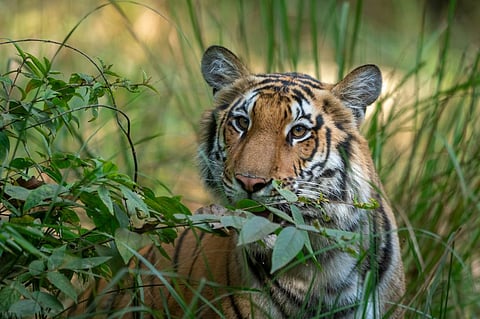

The postmortem examination reports of the four tigers who died in Dudhwa Tiger Reserve in Uttar Pradesh within two months has revealed the cause of their deaths.
Between April 21, 2023 and June 9, 2023, four adult tigers — three male and a female — reportedly died due to various reasons, a forest official said. The incident compelled the UP government to initiate an investigation and transfer officials responsible.
The primary investigation revealed lapses in patrolling and monitoring of the wild cats.
Read more: Grassroots victory
Speaking with Down To Earth, Bareilly Chief Conservator of Forests Lalit Verma said the autopsy reveals that deaths were due to natural causes and not any “suspicious circumstances” or “foul play”.
Verma said two of the tigers died due to injuries while fighting with other tigers in separate instances. “The other tigers were injured in the process and are still recovering,” he said.
These fights were a part of the natural traits of the wild animals, Verma said. “Tigers are territorial and often have disputes. The fights between these tigers seem to have arisen from that, resulting in clashes and eventual deaths due to injuries,” he added.
The other two tigers died due to infections. “Infections are caused and common among tigers especially when their immunity is weak or suffering with viral infection,” Verma said.
The infections and health issues of the animals went unnoticed, resulting in the deaths. “All these tigers were adults and in their prime,” he added.
The investigation report also revealed a number of lacunae in the administration. The shortage of field staff and lack of patrolling in the tiger reserve, was also highlighted by the report.
Increasing staff has been a priority since the deaths, said Verma. “A set of new range officers have been appointed to increase the staff strength. However, there are comparatively fewer subordinate forest guards and efforts are on to fill the vacant positions at the earliest,” he said.
At present, the tiger reserve is operating at a capacity of 40-45 per cent of the total staff. “We expect to have recruitment for more than 200 staff to fill the positions and efficiently operate the tiger reserve,” he said.
The Dudhwa National Park, part of the tiger reserve, is closed due to the monsoons at the moment. “Patrolling is in full swing to ensure safety and protection of tigers,” said Verma.
However, locals suspect the tigers who died of infection were injured by iron nails.
Forest officers put thick nails around the borders of the National Park to prevent villagers entering the protected area, said Pratap Singh, community member living around Dudhwa.
“These nails also hurt the tigers if they accidentally step on them. This is particularly in case of the newly acclimatising tigers who are shifted from one area to the other,” Singh said, adding villagers have witnessed such incidents.
Sahvaniya, resident of a village near the National Park, also agreed the nails harm tigers along with electric fences and other materials meant to keep the villagers and their animals out.
Read more: Officials gloat over eviction of tribals
“When villagers’ animals sometimes wander off on their own, even for a day, these nails are found in their feet. We have to be dug out so that the animals do not get further injured or infected,” said Sahvaniya.
However, Verma said such instances affecting the tiger population is not possible. “Tigers are physically strong animals and mainly confined to the forest areas. These nails are at the edges of the forest and tigers rarely move towards those areas as they avoid any human disturbance,” he said.
Such phenomena can be possible for animals like leopards, who have a tendency to move between forest areas and urban or human dwellings, Verma added.